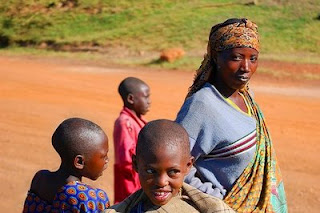Showing posts from category livelihoods.
-
The New U.S. Army Field Manual on Stability Operations: Visionary Shift or Missed Opportunity?
›October 17, 2008 // By Will Rogers Last week, the U.S. Army released its new field manual on stability and reconstruction operations, FM 3-07, the 10-month interagency brainchild of the Army, State Department, and U.S. Agency for International Development (USAID). Some have hailed the doctrine as a fundamental shift in Army policy that recognizes the significance of non-military threats to U.S. national security, while others have criticized it as a missed opportunity to critically re-examine notions of what constitutes security.
Last week, the U.S. Army released its new field manual on stability and reconstruction operations, FM 3-07, the 10-month interagency brainchild of the Army, State Department, and U.S. Agency for International Development (USAID). Some have hailed the doctrine as a fundamental shift in Army policy that recognizes the significance of non-military threats to U.S. national security, while others have criticized it as a missed opportunity to critically re-examine notions of what constitutes security.
The new doctrine aims to shift the burden of fostering stability in fragile states from the Army to the State Department and USAID, which are better prepared to address non-military threats. To paraphrase Lieutenant General William Caldwell IV at an October 8, 2008, event sponsored by the Center for Strategic and International Studies: The Army is up against non-military threats that can cause widespread destabilization—such as, access to basic necessities like food, water, and shelter—and with its traditional mandate to win wars with overwhelming military force, the Army does not have the expertise to address these threats.
Instead, a new Civilian Response Corps under the State Department and USAID will receive crisis training from the Army to prepare for managing conflict scenarios. The Army hopes that this interagency effort will expand civilian agencies’ capacity to prevent instability from devolving into state failure, which increases the chances of the Army being deployed. Sustainability and human security are clearly viewed as ways to achieve stability and prevent costly military deployments, not as goals in and of themselves.
According to Geoff Dabelko, director of the Environmental Change and Security Program, it is important “to distinguish whether addressing sustainability needs is a tactic or a goal or both. It can be both for militaries but at times it is merely a tactic to achieve stability rather than a fundamental rethink of how security should be defined.”
Tad Davis, the Army’s deputy assistant secretary for environment, safety, and occupational health, recently said, with respect to military operations and access to water in Iraq, “You can get out there…and deploy to an area for conducting operations, but if water’s not there for drinking purposes and for cooking, showering, laundry, things like that, then you’re not going to be able to sustain the force.” Clearly, Davis views environmental sustainability as key to the Army’s operations, but not necessarily as a critical component of a lasting peace.
Yet others argue that the Army would be wise to adopt long-term environmental sustainability and human security as immediate goals, as they would reduce the frequency with which the Army is dragged into conflicts. Dabelko wonders whether the War on Terror might be more successful “if part of a diversified response to the attacks of 9/11 would have included an aggressive effort to address poverty as an underlying source of grievances around the world rather than having just a uni-dimensional strategy of use of force. The symbolic and the real impact of such a strategy might have been quite tangible.” Nonetheless, the Army’s recognition that security is broader than military force is a laudable step—hopefully not the last—in the right direction.Photo: Two Iraqi girls from Al Buaytha, Iraq, pump water from a U.S. Army-supplied portable water tank. Courtesy of flickr user James Gordon. -
Weekly Reading
›In Poverty: Combating the Global Crisis, a paper for the Better World Campaign, Wilson Center Senior Scholar John Sewell urges the next U.S. president to focus on promoting open political and economic systems; universal education; better health systems and disease prevention; and equitable trade liberalization in order to reduce poverty.
“Somebody recently said water’s the new oil and there’s a lot to be said for that,” Tad Davis, the Army’s deputy assistant secretary for environment, safety, and occupational health, told Reuters. “If we don’t have water, then we don’t have the ability to perform,” said Davis.
Scientists attending the World Conservation Congress in Barcelona this week released The World’s Protected Areas, a book that examines past progress and continuing challenges in the struggle to protect some of the world’s most biodiverse places.
An Encyclopedia of Earth article examines the important role of forest-derived environmental income in the lives of the rural poor in developing countries. -
Exploring Brazil’s Urucu Natural Gas Fields Sustainably: An Impossible Task?
›September 29, 2008 // By Wilson Center StaffWhat does the Arctic National Wildlife Refuge (ANWR) have in common with Brazil’s Urucu natural gas fields? They both epitomize the struggle to balance energy independence and environmental conservation.
Located in the southern Amazon region and discovered in 1978, the Urucu fields are the largest onshore natural gas reserves in Brazil. Exploration began in 1988, but not without controversy. The Amazon rainforest, like ANWR, is a sensitive, biologically unique environment. Plans for exploration of the Urucu fields sparked heated debate over the extent of the environmental damage caused by such exploration—much like the current debate over oil drilling in ANWR.
Conservationists’ arguments revolved around two main issues: preservation of the environment and local communities’ livelihoods. The extraction complex will consist of three pipelines (map): Urucu-Coari (in existence); Urucu-Manaus; and Urucu-Porto Velho. The two new pipelines, which will total 621 miles of additional pipe, will also require the clearing of a 65-foot-wide strip along the entire pipeline. For the pipeline to reach Manaus, it needs to cross the six-mile wide Rio Negro, a tributary of the Amazon river. The project’s critics argue that even a small oil spill, especially in the stretches of the pipeline in the river, would harm the region’s biodiversity and the livelihoods of indigenous communities and others who depend on the river.
Petrobrás has sought to assuage activists’ concerns over the pipeline’s impact on local communities by assuring them that the Urucu gas fields will employ at least 3,800 local workers. In addition, Petrobrás is sponsoring community development projects to stimulate alternative economic activities.
Bolivia’s political crisis triggered Brazil’s decision to build the gas extraction pipelines, in spite of environmentalists’ misgivings. The December 2006 “nationalization” of natural gas in Bolivia, which provided Brazil with approximately half of its natural gas supply, made energy security and diversification of energy suppliers priorities for the government, and prompted Petrobrás to jumpstart a natural gas independence project in which Urucu features prominently.
While environmentalists may not have succeeded in stopping the development of the Urucu fields, their efforts have forced Petrobrás to significantly diminish the project’s environmental footprint. In conjuction with local universities and research centers, Petrobrás carried out an impact and risk analysis (Piatam) that led to the implementation of several environmental precautions. For example, the pipeline must be built eight feet under any river it crosses and permanently monitored by a cable embedded within the pipes. In addition, the extraction wells are very small, taking up very little forest area, and a remote control center that tracks any leaks in the pipeline is able to isolate and disable leaking pipes or valves, according to Jeff Hornbeck, an international trade and finance specialist at the Congressional Research Service (via email).
Moreover, all equipment is transported to the site by helicopters in order to avoid building roads, which frequently open up areas to logging and wider-scale development. Petrobrás also plans to use robots to monitor changes in environmental conditions, including the level of oil in the water; and to gather information to help prepare for emergency situations (e.g., flooding or other natural disasters) that threaten to damage the pipelines.
If Petrobrás executes the development of the Urucu fields successfully—with minimal negative consequences for communities and the Amazon—it could serve as an example for other energy projects in sensitive habitats. As growing energy needs increase demand for more exploration, environmentally conscious projects will become even more important.
By Brazil Institute Intern Ana Janaina Nelson.
Video: You can glimpse unspoiled forest outside the window of a plane landing at the Urucu fields, the product of Petrobrás’ efforts to minimize damage to the Amazon. -
Drought, War, Refugees, Rising Prices Threaten Food Security in Afghanistan
›September 23, 2008 // By Rachel WeisshaarDrought, continuing violence, returning refugees, and the spike in global food prices are combining to produce a serious threat to Afghan food security, reports the New York Times. The World Food Program has expanded its operations in Afghanistan to cover a total of nearly 9 million people through the end of next year’s harvest, sending out an emergency appeal to donors to cover the costs.
According to a report published earlier this year by Oxfam UK,[W]ar, displacement, persistent droughts, flooding, the laying of mines, and the sustained absence of natural resource management has led to massive environment degradation and the depletion of resources. In recent years Afghanistan’s overall agricultural produce has fallen by half. Over the last decade in some regions Afghanistan’s livestock population has fallen by up to 60% and over the last two decades, the country has lost 70% of its forests.
A post-conflict environment assessment conducted by the UN Environment Programme (UNEP) in 2003 confirms these dire trends in further detail. “In some areas, we found that up to 95 percent of the landscape had been deforested during the conflict—cut for fuel, bombed to remove cover, or removed to grow crops and graze livestock. Many people were fundamentally dependant on these forests for livelihoods. Without them, and without alternatives, Afghans were migrating to the cities or engaging in other forms of income generation—such as poppy production for the drug trade—in order to survive,” writes UNEP’s David Jensen in a forthcoming article in ECSP Report 13.
Despite the fact that agriculture has traditionally employed or supported approximately 80 percent of Afghans, says Oxfam, donors have vastly underinvested in the sector, spending only $300-400 million over the past six years directly on agricultural projects—a sliver of overall aid to Afghanistan.
Not only does hunger have negative impacts on health and economic growth, it could also make the security situation worse. “Development officials warn that neglecting [agriculture and development in] the poorest provinces can add to instability by pushing people to commit crimes or even to join the insurgency, which often pays its recruits,” reports the Times. In addition, an Oxfam International survey of six Afghan provinces found that land and water were the top two causes of local disputes.
To head off greater food insecurity and potential threats to overall stability, Oxfam UK recommends the development of a comprehensive national agricultural program; improved land and water management capacities; and greater support for non-agricultural income-generating activities, such as carpet-making.
Photo: An irrigated area near Kunduz, in northern Afghanistan. Courtesy of UN Environment Programme (source: Afghanistan Post-Conflict Environmental Assessment). -
Niger Delta Militants Escalate Attacks, Days After Government Establishes Ministry to Aid Delta’s Development
›September 19, 2008 // By Rachel WeisshaarNiger Delta militants destroyed Royal Dutch Shell’s Orubiri flow station on Tuesday and blew up a major oil pipeline near Rumuekpe on Wednesday, according to statements from the Movement for the Emancipation of the Niger Delta (MEND), the main insurgent group. On Monday, militants attacked other Shell oil facilities, killing a guard and forcing nearly 100 workers to evacuate. Clashes between the militants—who demand a larger share of the oil revenue and greater political autonomy for Niger Delta residents—and the Nigerian army have reduced the country’s crude oil output by more than 20 percent since 2006. The conflict is “perhaps the most significant, most volatile, and potentially dangerous in that part of the world,” says Wilson Center Africa Program Director Howard Wolpe, who is part of a working group formed to advise policymakers on the issue.
On Wednesday, MEND announced it was broadening the scope of its land attacks beyond Rivers state, the heart of the Niger Delta, and would also seek to target offshore oil rigs. On September 14, MEND declared an all-out war on the Nigerian government for the first time—only three days after its declaration of a cease-fire. The cease-fire came in response to the Nigerian government’s announcement of the creation of a new ministry to accelerate infrastructure development, job creation, and environmental cleanup in the impoverished region.Perhaps the declaration of both cease-fire and war within the space of three days is not so surprising, given the disagreement among Niger Delta leaders over the new ministry. In an online statement, MEND said,
The people of the region should receive this latest dish with apprehension and not allow the over five decades of starvation to rule our emotions as this is not the first time such ‘palatable’ offers have been served to the region from the late 50’s to date. Creating a ‘Ministry’ is not the coming of the much awaited messiah. Nigeria has in existence, ministries over 40 years old which have not positively impacted on the people. It will be yet another avenue for corruption and political favoritism.
Yet People’s Democratic Party Chief Okotie-Eboh had a different take: “It is a very good measure and it shows the sincerity of President Yar’Adua to resolving the Niger Delta crisis. We should give him a chance. This ministry will get allocations like other ministries to tackle the problems of the Niger Delta.”
Although views on the new ministry vary widely, all agree that the Niger Delta faces several grave security, economic, and environmental threats. For instance, an International Crisis Group report recently concluded that one “major issue that has to be dealt with in the context of reconciliation [between the Ogoni people and Shell] is environmental clean-up. No significant study has been conducted to determine reliably the precise impact of oil industry-induced environmental degradation on human livelihoods in the area, but there are indications of severe damage.”
Yet the Delta must also contend with the longer-term implications of its demographic challenge. Forty-five percent of Nigeria’s population is younger than 15, which amounts to a serious youth bulge. The government’s chronic inability to provide these young people with education, health care, and jobs is likely contributing to instability in the Delta.
Photo: MEND fighters and hostages. Courtesy of Dulue Mbachu and ISN Security Watch. -
PODCAST – Virunga National Park and Conflict in the DRC
›September 11, 2008 // By Geoffrey D. Dabelko“The resource base is a point of contact for local residents, refugees, rebel groups, park rangers, [and the] military as they struggle to survive,” says Richard Matthew of the University of California, Irvine, in this podcast interview, describing the significance of Virunga National Park to the diverse collection of actors in the eastern Democratic Republic of the Congo. Matthew cites a fundamental tension between the needs of the park—which is home to some of the few remaining mountain gorillas in the world—and the desperate humanitarian needs of the people living in and around it. On a recent assessment trip to the area for the UN Environment Programme (UNEP), Matthew and his colleagues met with many of these groups to help find ways to reduce pressure on the park’s natural resources, while recognizing they are key to the livelihoods of millions of needy people in the region. I also asked Matthew to highlight some of the human security topics he and his colleagues pursue at the Center for Unconventional Security Affairs at UC Irvine. One such topic is microfinance. “Microfinance lending rarely takes into consideration the environmental impact and conflict-inducing impacts,” says Matthew. He and his colleagues are convening practitioners and conducting research on practical ways to “green” and reduce the conflict-generating impacts of this increasingly popular development strategy.
I also asked Matthew to highlight some of the human security topics he and his colleagues pursue at the Center for Unconventional Security Affairs at UC Irvine. One such topic is microfinance. “Microfinance lending rarely takes into consideration the environmental impact and conflict-inducing impacts,” says Matthew. He and his colleagues are convening practitioners and conducting research on practical ways to “green” and reduce the conflict-generating impacts of this increasingly popular development strategy.
I conducted this interview in a noisy UN cafeteria in New York City. We were both in town to meet with David Jensen and colleagues from UNEP’s Disasters and Conflicts Programme and the UN Peacebuilding Commission. Expect a podcast and article soon from Jensen on the New Security Beat and in the Woodrow Wilson Center’s Environmental Change and Security Program Report, respectively.
Photo: A charcoal checkpoint in Virunga National Park. Courtesy of Richard Matthew. -
Amazon Fund to Target Sustainable Development; Strong First Step, Say Experts
›August 30, 2008 // By Wilson Center Staff Last month, in an effort to prevent further deforestation of the Amazon, Brazil announced the creation of the Amazon Fund, which aims to make preserving the world’s largest tropical rain forest more lucrative than destroying it. Norway was the first country to contribute to the initiative, offering a pledge of $100 million. Officials project that the fund may receive up to $1 billion in its first year and may accrue as much as $21 billion by 2121.
Last month, in an effort to prevent further deforestation of the Amazon, Brazil announced the creation of the Amazon Fund, which aims to make preserving the world’s largest tropical rain forest more lucrative than destroying it. Norway was the first country to contribute to the initiative, offering a pledge of $100 million. Officials project that the fund may receive up to $1 billion in its first year and may accrue as much as $21 billion by 2121.
By creating an endowment open to international investors, Brazil appears to have shed some of its usual suspicions of foreign encroachment on the Amazon and acknowledged that conservation efforts will only be sustainable with considerable outside support. Yet the funds will still be controlled by Brazil’s National Development Bank (BNDES)—which, according to BNDES environment director Eduardo de Mello, means “donors will have no say over the use of [the Amazon Fund’s] resources.” Within BNDES, a steering committee made up of federal and state officials will be in control of the funds. According to the proposal listed online by BNDES, the Amazon Fund will target the following areas: Brazilian sovereignty; infrastructure development; combating deforestation; indigenous rights; sustainable development; and government, business, and civil cooperation.
The Amazon Fund is guided by the Brazilian government’s Plano Amazônia Sustentável (PAS), or Sustainable Amazon Plan, which was issued in May 2008. Carlos Nobre, a senior climate scientist at Brazil’s National Institute for Space Research, was one of the principal architects of this plan, and presented it to an American audience at a January 16, 2008, conference at the Woodrow Wilson Center. PAS offers a holistic vision for protecting the Amazon that goes beyond conservation efforts, calling for the creation of a new economic paradigm centered on sustainably “globalizing the development capacity of the Amazon and producing value-added goods and services.” Nobre told Reuters that while the Amazon Fund is a positive initial step, it nevertheless “just postpones deforestation…the final fix is to create a new economy that can give jobs to several million people.” This “paradigm shift,” he explained, requires the entrepreneurial capacity to “translate biodiversity wealth into economic wealth.”
Response to the Amazon Fund has been generally positive, albeit guarded. According to Paulo Gustavo Prado, environmental policy director of Conservation International’s (CI) Brazil program, the Fund is a helpful move in the fight to combat deforestation in the Amazon, but is still a work “under construction” (e-mail exchange with Alan Wright). For instance, it is possible that the resources will be used to fill “gaps in governance”—in other words, to fund additional enforcement actions against illegal logging in the Amazon—and therefore have little direct impact on Amazonian society as whole. He observed that the prospect for private-sector involvement seems limited by the fact that funders will have no influence over the use of funds, so the initiative is unlikely to draw money for carbon-offset projects. Prado remarked that by reducing the cost of conservation-related activities, it appears that the Amazon Fund will encourage the work of organizations such as CI. He also stressed CI’s commitment to see that the Fund will be made available to researchers and scientists, and that indigenous and local communities and state and municipal governments will be involved in the decision-making process.
It remains to be seen how other issues—such as the ambitious Initiative for the Integration of the Regional Infrastructure of South America (IIRSA), lingering land rights issues, and Brazil’s commodity export boom—will affect the Amazon Fund’s overall efficacy.
By Brazil Institute Program Assistant Alan Wright and Brazil Institute Intern Matthew Layton.Photo: Area deforested for agricultural use in the state of Mato Grosso, Brazil. Courtesy of flickr user leoffreitas.
-
Population Growth, Environmental Degradation Threaten Development in Uganda
›August 28, 2008 // By Sonia Schmanski Climate change, increasing population, and overuse of land, fisheries, and water supplies threaten to undermine development in Uganda, writes Pius Sawa for the Africa Science News Service. Olive Sentumbwe Mugisa, the World Health Organization’s (WHO) population and health advisor in Uganda, warns that Uganda’s economic growth is not keeping pace with its population growth, which is among the fastest in Africa, due to a fertility rate of 6.7 children per woman.
Climate change, increasing population, and overuse of land, fisheries, and water supplies threaten to undermine development in Uganda, writes Pius Sawa for the Africa Science News Service. Olive Sentumbwe Mugisa, the World Health Organization’s (WHO) population and health advisor in Uganda, warns that Uganda’s economic growth is not keeping pace with its population growth, which is among the fastest in Africa, due to a fertility rate of 6.7 children per woman.
Native Ugandan Gladys Kalema-Zikusoka spoke about the interconnectedness of population, health, and environment issues in Uganda in two events at the Wilson Center in May of this year. Kalema-Zikusoka is the founder and director of Conservation Through Public Health (CTPH), which works to conserve the habitat of the endangered mountain gorilla by strengthening community health services and providing communities with information about the benefits of family planning.
Kalema-Zikusoka is also the author of an upcoming issue of Focus, the Environmental Change and Security Program’s series of occasional papers featuring Wilson Center speakers. Her piece describes CTPH’s work in and around Bwindi Impenetrable National Park, where it has found great success in addressing health, conservation, family planning, and livelihood issues in an integrated fashion.
Photo: Woman and children in southern Uganda. Courtesy of flickr user youngrobv.


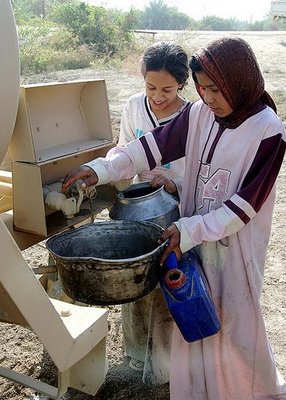 Last week, the U.S. Army released its new
Last week, the U.S. Army released its new 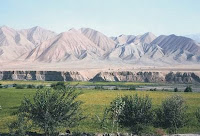
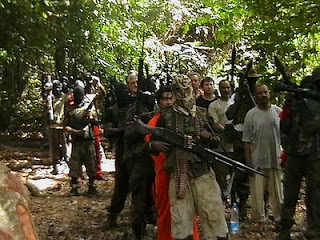
 I also asked Matthew to highlight some of the human security topics he and his colleagues pursue at the
I also asked Matthew to highlight some of the human security topics he and his colleagues pursue at the 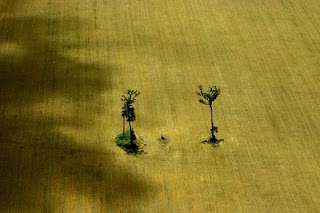 Last month, in an effort to prevent further deforestation of the Amazon, Brazil announced the creation of the
Last month, in an effort to prevent further deforestation of the Amazon, Brazil announced the creation of the 